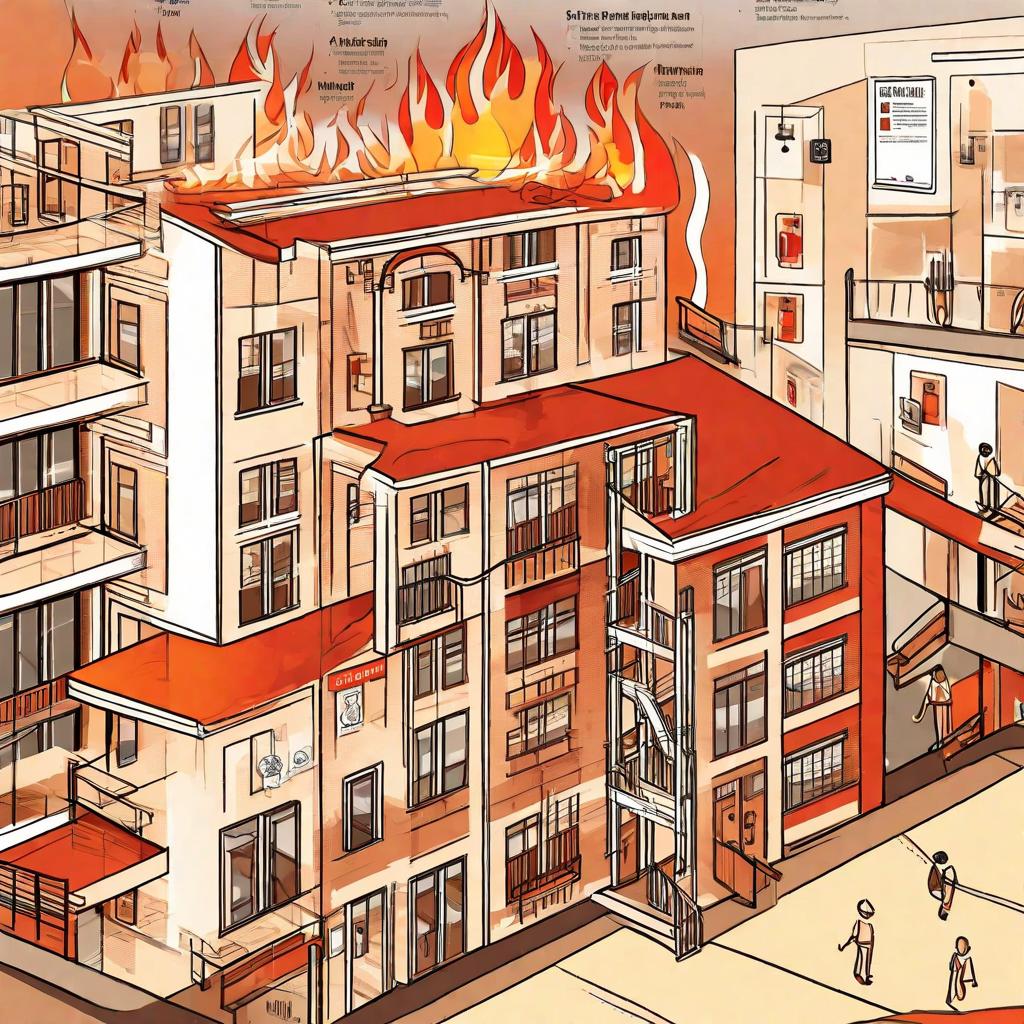
Navigating Student Housing Regulations in the UK: A Comprehensive Guide to Staying Informed
UK Regulations for Student Housing

When it comes to student housing, there are important regulations that need to be understood to ensure the safety and well-being of students. The United Kingdom has implemented a comprehensive set of rules and guidelines to govern student accommodation. In this guide, we will take a closer look at the importance of these regulations, the role of local councils in their enforcement, and the various types of student housing available.
Understanding the Importance of Regulations in the UK
Regulations play a crucial role in maintaining high standards of safety and quality in student housing. They aim to protect tenants from potential hazards and ensure that landlords provide a suitable living environment. By adhering to these regulations, both students and landlords can have peace of mind, knowing that their rights and responsibilities are clearly defined.
The Role of Local Councils in Governing Student Accommodation
Local councils are responsible for enforcing the regulations related to student accommodation in the UK. They play a crucial role in conducting inspections, granting licenses, and ensuring that housing providers meet the required standards. These councils work closely with universities and other educational institutions to ensure that students are provided with safe and reliable housing options.
Overview of the Various Types of Student Housing
Student housing in the UK comes in various forms to cater to the diverse needs and preferences of students. This includes purpose-built student accommodation (PBSA), university-owned housing, private rented accommodation, and house shares. Each type offers unique advantages and may have different regulations and requirements that students and landlords need to be aware of.
Health and Safety Regulations for Student Accommodation

The health and safety of students living in accommodation should always be a top priority. The UK regulations have specific guidelines in place to ensure that student housing is equipped with adequate fire safety measures, electrical safety requirements, and gas safety regulations.
Fire Safety Measures and Regulations

1. Guidelines for Fire Detection and Prevention Systems
Fire detection and prevention systems are one of the most crucial aspects of student accommodation safety. The regulations require housing providers to install and maintain smoke detectors, fire alarms, and fire extinguishers throughout the premises. Regular testing and maintenance of these systems are also mandatory to ensure their effectiveness.
2. The Importance of Fire Escape Routes and Exits
In the event of a fire, having clearly marked fire escape routes and accessible exits can make all the difference. Regulations stipulate that there should be unobstructed access to these routes and exits at all times. Landlords must ensure that these escape routes are well-maintained and easily accessible to all occupants of the building.
3. Fire Safety Certificates and Annual Inspections
To ensure compliance with fire safety regulations, landlords are required to obtain a valid fire safety certificate for their student accommodation. These certificates are issued after a thorough inspection by professionals who assess the property’s fire safety measures. Annual inspections are also necessary to maintain the validity of the certificate and to ensure that the fire safety standards are being upheld.
Electrical Safety Requirements for Student Housing

1. Essential Electrical Safety Checks and Certifications
Electrical safety is of utmost importance in student housing. Regulations enforce the need for regular electrical safety checks conducted by certified professionals. These checks assess the condition of wiring, sockets, and electrical appliances to identify any potential hazards. It is vital for landlords to obtain the necessary certifications to demonstrate that their accommodation is electrically safe.
2. Guidelines for Ensuring Safe Electrical Appliances
Students rely heavily on electrical appliances for their daily needs, which makes it crucial for landlords to ensure their safety. Regulations require landlords to provide safe and well-maintained appliances that meet the necessary electrical safety standards. Regular checks, maintenance, and PAT (Portable Appliance Testing) certification are essential to ensure the continued safety of these appliances.
3. Importance of Regular Electrical Inspections and Maintenance
Regular inspections and maintenance of electrical systems and appliances are necessary to prevent accidents and ensure the safety of students. Landlords should schedule periodic inspections to identify any potential faults or hazards. Additionally, conducting maintenance in a timely manner helps to prevent any electrical issues from escalating into more serious problems.
Gas Safety Regulations in Student Accommodation

1. Legal Obligations for Landlords regarding Gas Safety
Gas safety is a critical aspect of student accommodation regulations. Landlords have a legal obligation to ensure that gas appliances, such as boilers and cookers, are safely installed and maintained. They must also provide a gas safety certificate to their tenants, proving that the accommodation has undergone a thorough inspection by a Gas Safe registered engineer.
2. Annual Gas Safety Checks and Certificates
To maintain compliance with gas safety regulations, landlords must conduct annual gas safety checks. These checks ensure that all gas appliances in the accommodation are functioning properly and pose no risks to the tenants. A gas safety certificate is issued after a successful inspection, providing evidence of the accommodation’s adherence to gas safety regulations.
3. Awareness of Carbon Monoxide Poisoning Risks and Prevention
Carbon monoxide poisoning is a silent killer, making it essential for landlords to be aware of the risks and take preventive measures. Regulations require the installation of carbon monoxide detectors in properties with gas appliances. It is crucial for landlords to regularly test these detectors and educate students about the dangers of carbon monoxide, as well as the actions to take in case of a leak.
Tenancy and Housing Standards for Student Rentals

Ensuring fair and consistent tenancy and housing standards is essential to protect both students and landlords. In the UK, these standards are enforced through assured shorthold tenancies and regulations governing minimum housing requirements and maintenance obligations.
Assured Shorthold Tenancies for Students
1. Understanding the Basics of Assured Shorthold Tenancy Agreements
Assured Shorthold Tenancy (AST) agreements are the most common types of contracts used in student rentals. They provide certain rights and responsibilities to both tenants and landlords. Understanding the basic terms and conditions of an AST agreement is crucial for students to ensure a smooth and fair tenancy.
2. Key Rights and Responsibilities for Both Tenants and Landlords
AST agreements outline the rights and responsibilities of both tenants and landlords. These include the right to a safe and habitable living environment, the responsibility to pay rent on time, and the obligation to maintain the property in good condition. Understanding these key rights and responsibilities helps in resolving any disputes that may arise during the tenancy.
3. The Role of Tenancy Deposits and Deposit Protection Schemes
To safeguard the interests of both tenants and landlords, regulations require the protection of tenancy deposits. Landlords must protect these deposits in a government-approved deposit protection scheme. This ensures that the deposit is returned to the tenant at the end of the tenancy, provided that all terms of the agreement have been met.
Minimum Housing Standards for Student Accommodation
1. Overview of Minimum Space and Security Requirements
Regulations define minimum space requirements for student accommodation to ensure that tenants have adequate living conditions. These requirements cover aspects such as bedroom sizes, communal spaces, and storage facilities. Additionally, regulations also focus on providing secure accommodation to prevent unauthorized access and enhance student safety.
2. Ensuring Adequate Sanitation Facilities and Amenities
Minimum housing standards encompass the availability of sanitary facilities and amenities. Regulations stipulate that students should have access to clean and functional bathrooms, toilets, and kitchens. Adequate provision of heating, lighting, and ventilation is also essential to maintain a comfortable living environment.
3. Addressing Dampness, Ventilation, and Energy Efficiency Standards
To provide a healthy and energy-efficient living environment, regulations address the issues of dampness, ventilation, and energy efficiency. Landlords are responsible for mitigating dampness, ensuring proper ventilation systems, and implementing energy-efficient measures to minimize the environmental impact of student accommodation.
Maintenance and Repairs in Student Housing
1. The Responsibility of Landlords for Property Maintenance
Maintaining the property in good condition is the responsibility of landlords. They must address any repairs or maintenance issues promptly to ensure that students have a safe and habitable living environment. Regular inspections and preventive maintenance can help identify potential problems before they escalate.
2. Handling Repairs and Disrepair Issues in a Timely Manner
When repairs are needed in student accommodation, landlords should address them in a timely manner. Regulations require landlords to respond promptly to repair requests from tenants and to ensure that repairs are carried out to a satisfactory standard. Open lines of communication and clear procedures for reporting repairs help in resolving any disrepair issues efficiently.
3. Tenant Rights to Request Repairs and Maintenance
Tenants have the right to request repairs and maintenance when needed. Regulations provide a mechanism for tenants to report any issues to their landlord or property management company. It is important for students to know and exercise their rights to ensure that their living conditions remain safe and comfortable.
Planning Permission and Property Licensing for Student Housing

Complying with planning permission and property licensing regulations is essential for landlords to legally operate student accommodation. These regulations help maintain the integrity of local communities and ensure that student housing meets specific requirements.
Need for Planning Permission in Student Accommodation
1. Understanding Permitted Development Rights for Conversions
Permitted development rights allow property owners to make certain changes to their buildings without the need for planning permission. Landlords who want to convert existing properties into student accommodation must be aware of the specific permitted development rights in their area. Adhering to these rights helps streamline the planning process.
2. Submitting Planning Applications for Larger Student Developments
For larger student housing developments, planning permission is usually required. Landlords must submit planning applications to the local council, providing detailed information about the proposed development. These applications undergo thorough assessments to ensure that the development meets local planning policies and contributes positively to the surrounding area.
3. Overcoming Potential Planning Obstacles and Restrictions
Navigating through planning permission requirements can sometimes be challenging due to potential obstacles and restrictions. These may include constraints related to property use, conservation areas, or objections from local residents. However, landlords can work with planning consultants or professionals to overcome these obstacles and ensure compliance with regulations.
Mandatory Licensing for Houses in Multiple Occupation (HMOs)
1. Defining HMOs and their Importance in Student Housing
Houses in Multiple Occupation (HMOs) are properties shared by multiple unrelated individuals who do not form a single household. HMOs play a significant role in student accommodation, providing an affordable and sociable living experience. However, HMOs require mandatory licensing to ensure the safety and welfare of the tenants.
2. Licensing Requirements for Different Types of HMOs
Different types of HMOs have varying licensing requirements, depending on the number of occupants and the property’s location. Regulations define specific criteria that landlords must meet to obtain an HMO license. These criteria typically include safety measures, amenity provisions, and suitability of the property for multiple occupancy.
3. Consequences of Non-compliance with HMO Licensing Regulations
Failing to comply with HMO licensing regulations can have serious consequences for landlords. Penalties may include fines, rent repayment orders, or even criminal convictions. It is essential for landlords to understand and fulfill their obligations to avoid these potential repercussions and protect the interests of their tenants.
Additional Selective Licensing Schemes and Article 4 Directions
1. Local Authority Selective Licensing Schemes for Specific Areas
In certain areas, local authorities may implement selective licensing schemes to address specific issues or raise standards in the private rented sector. These schemes require landlords to obtain a license for their properties, ensuring that they meet specific criteria. It is important for landlords to stay informed about any selective licensing schemes that may be applicable to their student accommodation.
2. The Effect of Article 4 Directions on Property Use Changes
Article 4 Directions are used by local authorities to control changes in property use within designated areas. They can impact student housing by requiring specific planning permissions for certain types of property conversions. Landlords need to be aware of any Article 4 Directions in their area to ensure compliance and avoid potential legal implications.
3. Keeping Up with Local Licensing Policies and Changes
Local licensing policies and regulations can change over time. Landlords should stay updated with any revisions or new requirements to ensure ongoing compliance with local regulations. Regularly checking with local councils, attending relevant seminars, or engaging with professional organizations can help landlords stay informed about the latest developments in student housing regulations.
Summary and Frequently Asked Questions (FAQs)

This comprehensive guide aimed to provide students and landlords with a detailed understanding of the essential UK regulations governing student housing. By staying informed and adhering to these regulations, both parties can ensure the safety, quality, and legality of their student accommodation.
Recap of Key Points Covered in the Article
1. UK regulations for student housing are crucial for ensuring safety and quality.
2. Local councils play a vital role in enforcing these regulations.
3. Student housing comes in various types, including purpose-built accommodation, private rentals, and shared houses.
4. Health and safety regulations cover fire safety, electrical safety, and gas safety.
FAQs on UK Regulations for Student Housing
1. What should I do if my student accommodation lacks necessary safety measures?
If your student accommodation lacks necessary safety measures, you should immediately report the issue to your landlord or property management company. They have a legal obligation to address any safety concerns and ensure that the accommodation meets the required standards. If they fail to take appropriate action, you can contact your local council or seek legal advice.
2. Do all student housing properties require an HMO license?
Not all student housing properties require an HMO license. The requirement for an HMO license depends on the specific criteria defined by the local council. It is important for landlords to check with their local council to determine whether their property falls under the HMO licensing regulations.
3. Can a landlord evict a student during the course of their tenancy?
A landlord can only evict a student during the course of their tenancy if there are genuine reasons and they follow the legal procedures outlined in the tenancy agreement. The eviction process is governed by specific regulations to protect the rights and interests of the tenant. If you believe that you are facing unfair eviction, you should seek legal advice to understand your rights and options.
4. Are there any specific regulations for international students renting in the UK?
International students renting in the UK are subject to the same regulations as domestic students. The regulations governing student housing focus on safety, quality, and tenant rights, regardless of the tenant’s
If you are a landlord looking for tailored advice on UK student housing regulations, please get in touch with our team today!